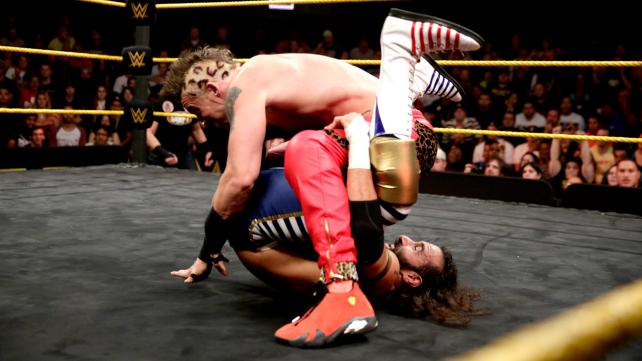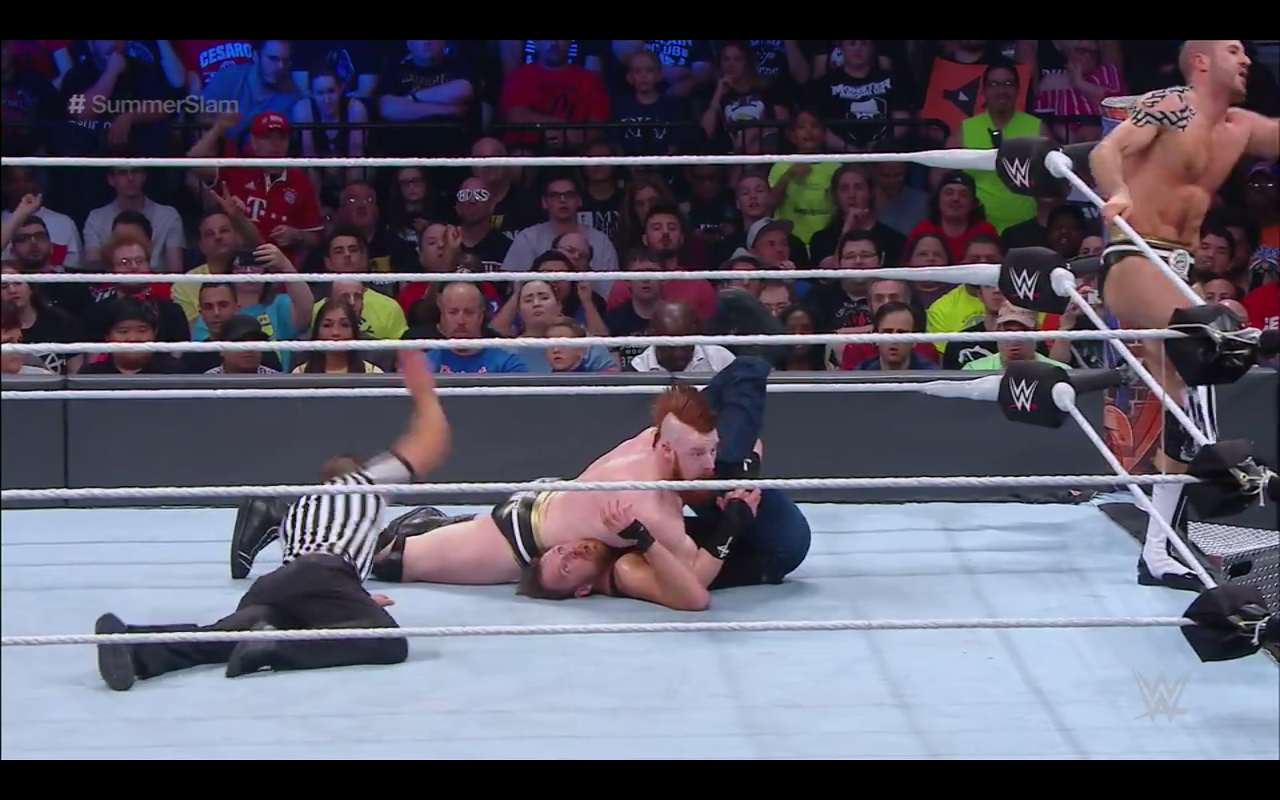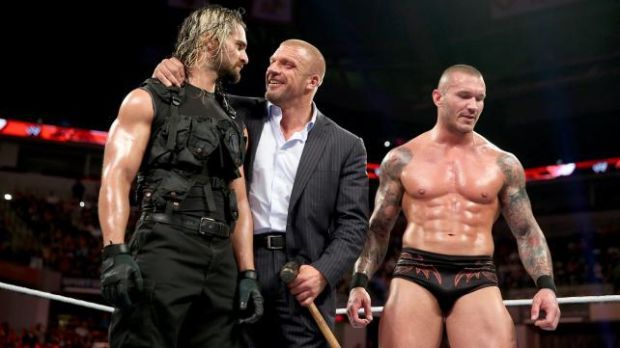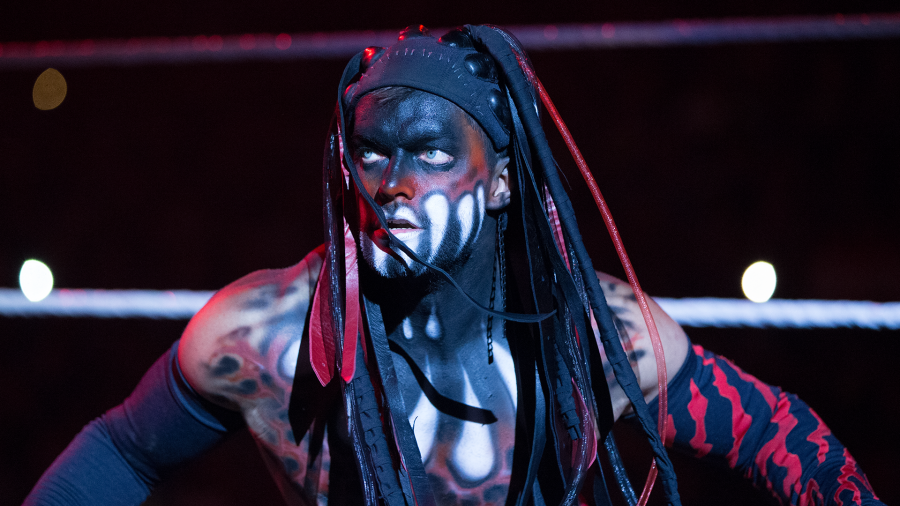The Art of Wrestling Is In The Details
THE ART OF WRESTLING IS IN THE DETAILS
EDITORIAL BY TIM KAIL
The pro-wrestling community does a lot of debating about "no-selling", "dick flips", and "beach balls" these days.
But what about the roll-up?
What about how a wrestler uses their eyes during a pin?
What about the little, fundamental details of professional wrestling that get buried under high spots, hand-gestures, headbutts, entrances, memes, and chants from self-obsessed audiences? I'm certainly guilty of falling prey to the analysis of these popular topics (see my article from two weeks ago and this thread from two days ago).
That's why it's important to occasionally refocus on the basics and give our brains a bath.
There are few things in professional wrestling more basic than a roll-up and what to do with one's eyes during a pin.
The roll-up is a common form of a cover (a cover is an attempt to pin one's opponent to the mat for the count of three so as to secure victory). A roll-up typically looks like one wrestler sneaking up behind another wrestler, reaching between their legs, pulling them backwards in a reverse somersaulting motion, and then pressing down so that their shoulders are firmly on the mat.
Dean Ambrose rolls up Seth Rollins
The roll-up is often done quickly and unexpectedly, resulting in surprise bursts of emotion from the crowd. The roll-up can be augmented in various ways based upon the styles and personalities of the wrestlers doing it. For example, a heel might pull their opponent's tights during the roll-up for "added leverage".
Some of the most intense moments in professional wrestling matches have been the result of this familiar action. But the execution of roll-ups has lapsed in a way that undermines their believability. The story of the roll-up has been taken for granted, and so the art of the roll-up has been lost.
How?
Wrestlers simply aren't kicking out of roll-ups anymore.
Wrestlers are being let out of roll-ups.
This problem is so ubiquitous that it's not worth identifying any specific wrestler or specific promotion for this trend. Everyone is to blame.
Whenever a referee gets to the count of two during a roll-up today, the most common response is for the wrestler who is doing the pinning to just let go while the other wrestler casually completes their somersault and gets back up onto their feet without even trying to make it seem like they've kicked out. This "letting go" effect negates the entire purpose of a roll-up and compromises the integrity of wrestling matches.
The only explanation for why the roll-up has gotten to this sad state must be that the viewers and the wrestlers are so inured to the move that they just don't care about it anymore. Wrestlers appear to simply "give up" on the spot as it's happening. The climax of the roll-up is not being told as a result, and the fans have been conditioned to accept poor execution as the norm. That makes for less intense pops. Certainly not every roll-up is guilty of this, but it appears more often than not and enough for it to be a noticeable problem.
This is not some subtle critique of a subtle conceptual issue in professional wrestling that's hard to wrap one's brain around. Doing roll-ups in this halfhearted way is a blatant, observable mistake, and it happens every week with stunning regularity. The poorly executed roll-up is so common and visible that I'm surprised it has managed to persist unabated.
Why aren't veteran wrestlers, trainers, agents, producers...anyone...behind the scenes offering direct constructive criticism, consistently, to talent on this specific aspect of their performance?
If they are, it's not evident in the slightest because it keeps happening and it has been happening for years. This is not just some problem with millennials who lack discipline. This has been going on for much longer than the WWE's "New Era".
This "letting them up" effect just shouldn't be happening.
It is not a pro-wrestling "style".
It is not an "expression of one's art".
It is not a new interpretation of a familiar spot.
It is a mistake, plain and simple.
It is doing something badly.
It is one of the clearest, easiest flaws in one's performance to identify and it is incredibly easy to say, "What the hell are you doing? Stop doing that! Don't just let them out of the cover. Make them kick out of it!"
Or, to the person on the receiving end of the roll-up who doesn't even bother kicking out, it's easy to say, "What the hell are you doing? Stop doing that! Try to get out of it! This is a fight for god's sake. You're about to get beat! Don't let them just...let you out!"
Limp roll-ups completely lack agency and reality, destroying the spot with every feigned attempt. This problem is so obvious that it's reminiscent of the way many wrestlers (whilst being pinned) blatantly look at the referee during a count. Few mistakes in pro-wrestling are so brazen and noticeable.
Whenever I see a wrestler watching the referee's count as they are being pinned, I want to shout at the television:
We see you!
Do you not know that we see you!
You need to know that we see you!
Summer Slam 2017, Dean Ambrose & Seth Rollins vs Cesaro & Sheamus
Within the story of a wrestling match there is no logical explanation for why a wrestler would intently watch a referee's count. Any attempt to justify why a wrestler would keep their eyes on the ref's hand during a count is an attempt to excuse blatantly bad technique. No wrestler purposefully watches a referee's hand during a count because they believe that's what their character would do. A wrestler watches a referee's hand so that they can know exactly when to kick out. That's it. There's no other reason. It's a shortcut. There's no narrative justification for it. And so it completely destroys the fiction of a pin, and completely ignores that an essential component of the art of professional wrestling is sleight of hand.
If a wrestler is in a "pinning predicament", the story of that situation is that they are so dazed, damaged, or caught off guard that they're unable to process what's happening in a focused way. It takes them a couple seconds to realize what's going on and then they react. If that moment is being simulated realistically, when they kick out, it will appear instinctual or natural. The wrestler's story is that they kick out because they are athletes who know the rhythm of their sport and they can sense that the referee is about to call "three!" They don't want to lose. That's why they kick out.
It's important we all remind ourselves of this basic fundamental pro-wrestling concept occasionally; wrestlers kick-out because they don't want to lose.
Wrestlers pin other wrestlers because they want to win.
In a legitimate, amateur wrestling match, a wrestler is always struggling to get out. They are not waiting intently for a specific moment to look like they've gotten out so as to elicit the strongest reaction from the audience. The wrestler is always trying to get out of a pin and they are always trying to win.
A pro-wrestler, therefore, (if we think of pro-wrestling as real) would kick out at one, or even before a count starts, if they could. It's not as though a pro-wrestling character wants to get close to being beaten. Kicking out at two should never be something a wrestler transparently does to elicit a bigger pop; it should be done because they find the strength at the last available moment and manage to break free. Each moment in a match is like a sentence in a story, building to a larger, more cohesive narrative grounded by the reality of sport. Not only does watching a referee's hand during a count destroy the fiction of a cover, it tells the audience when a match is and is not going to end.
If I'm able to see a wrestler waiting for the two-count to kick-out, then I know this isn't going to be the finish of the match. I know he's going to kick-out and so there is no reason for me to care or emotionally invest in that particular cover. If I've noticed that wrestler watch every count until finally, he doesn't, then I know that will be the final count. This lessens the effectiveness of the entire match. I'm no longer watching wrestling; I'm watching an impression of wrestling.
Someone should be telling wrestlers these things daily.
Wrestlers should be told, in no uncertain terms, why it is incredibly bad to keep one's eyes on the ref during a pin. And wrestlers should be able to hear this without their "feelings getting hurt".
Artists of any kind should hear that something is bad, be provided visual evidence that something is bad, and then confidently make the adjustment because it is the right, simple, obvious thing to do. A wrestler who intently watches the referee's hand as they lay on their back might as well get "Pro-Wrestling Is Fake" tattooed on their forehead.
These are the tiny details that either preserve or undermine the true art of professional wrestling; that art being the ability to make wrestling look real, and not like a performance choreographed by athletic actors.
If you are offended by what you've just read, and you think, "Who does this guy think he is?!" well then I agree with you.
I should not be the one telling you that watching the referee's hand during a count and not kicking out of a roll-up is blatantly bad technique. Your mentors should have told you this a long time ago. Your peers should remind you of it. I have absolutely no idea why they aren't (or at least it doesn't seem like they are). Their lack of specific constructive criticism about these basic aspects of pro-wrestling performance is the only explanation I can fathom for why these mistakes persist. If the only advice today's generation receives is "get over" and "remember to have fun out there", it's no wonder these mistakes keep happening.
Seth Rollins (right), Triple H (center), Randy Orton (right)
These critiques should come from peers and mentors because podcasters and internet analysts are not trustworthy nor reliable. They are not always accurate, they are not always intelligent, they are not always original, and they are not always good at what they do.
It's easy for a wrestler or a promotion to dismiss everything I've written here because I'm not in that locker-room. I'm not a part of that culture and that mentality. Just as I'm unlikely to seriously consider criticism about my writing from someone who's never written a word in their life, a wrestler is rightfully unlikely to take criticism from someone who has never taken a bump. My observations, even about obvious mistakes like bad roll-ups and watching counts, still exist outside of the wrestler's lived experience. This makes my observations inherently less powerful than someone who has lived that experience.
I'm not staring a wrestler in the eyes, a lifetime of direct knowledge at my disposal, offering this sincere critique in a manner that's likely to be taken to heart. Criticism needs to be delivered in a personal, tangible way if it's going to be convincing.
Internet criticism, even if it's good, shares the same space with "haters", bigots, and idiots; it's never going to be as effective as Stone Cold Steve Austin burning a hole your head with his steely blue gaze and telling you, "That looked like shit. Do it better, kid".
Bayley and Steve Austin discussed some of these mistakes on Steve's podcast recently. They agreed that watching the referee count was a "dead giveaway". Are these conversations not also happening in locker rooms? Are the promoters, agents, bookers, and producers not saying, to the entire roster in joint meetings, "Stop looking at the referees when they count - just listen to it - feel it"? Are the show-runners not noticing that this is happening?
Perhaps people are hesitant to offer such simple constructive criticisms for fear that they might be "taken the wrong way". If that's the case, then that's a ridiculous and sad creative culture. Artists need to hear the hard truth or else they'll never get better. And it's not like, "Stop looking at the ref" is a really hard truth to accept! It's painfully basic. It's not, "Your entire gimmick is stale - you don't seem committed - change everything about yourself because you are not telling people the truth and we have no idea who you are."
My mentors and my critics never held my hand through their criticisms. There was no time to be soft. They shattered my soul and then forced me to pick up the pieces. If a writer wasn't tough enough or smart enough to handle those criticisms and learn from them, they were kicked out of the program or they quit. That kind of creative environment seems to be considered too harsh by many modern standards, and that is a shame. It should be difficult to be good. Mediocrity and mistakes should not be rewarded. Artists should not be coddled. Artists should know, instinctively, when they can do better.
My mentors saw mistakes I made and they correctly identified them as such. They didn't frame them as "opportunities for growth". I was doing something wrong, and they told me so. I resisted, of course. I defended myself. That's normal. But, eventually, because they were good mentors observing the truth, I came to understand what they were teaching me. They weren't vindictive or insulting when they told me my writing was "juvenile" or "too angry" or "incoherent" or "limited". They were just right. After enduring that process, I became a better, more confident artist. I took what they said, made it my own, and improved. Some of their advice turned out to be useful. Some of it didn't. All of it was informative.
Demon Finn Balor
Good art is forged in the fires of that pain. But the pain of hearing, "You're doing it wrong" goes away the instant you start doing it right.
Roll-ups are being done wrong.
Looking at the referee as he counts the pin is wrong.
Someone trustworthy, especially someone who can actually convince wrestlers to listen (like their mentors and peers) needs to pull the talent aside and explain this to them. I'm not advocating for cruelty or shaming or bullying; I'm advocating for good mentorship based upon reality and trust. I write this not as some crabby ex-promoter or ex-writer or bitter old-timer who longs for the days "when wrestling was great".
I don't hate flips. I don't think everyone is the same. I don't think Joey Ryan is the death of the wrestling business. I don't think the WWE is terrible. I don't think indy-wrestling doesn't count.
I write this as a thirty-one-year-old man who loves good wrestling, respects wrestlers, and sees a mistake happening on television every week. I write this as an analyst who wonders why something so fundamental has been forgotten. I write this as someone who believes wrestling, itself, is always great, regardless of the era or the country.
But a bad roll-up is a bad roll-up and looking at the referee's hand during a count is choosing to ignore the core principles of pro-wrestling. There's no good excuse for it, and there's even less an excuse for not calling these mistakes what they are. It's not the end of the world that these mistakes have happened, but it is important for the longterm health of pro-wrestling that we clearly identify these basic, obvious flaws and correct them.
This generation of wrestlers is too good to settle for anything less.
FOLLOW ME ON SOCIAL MEDIA









